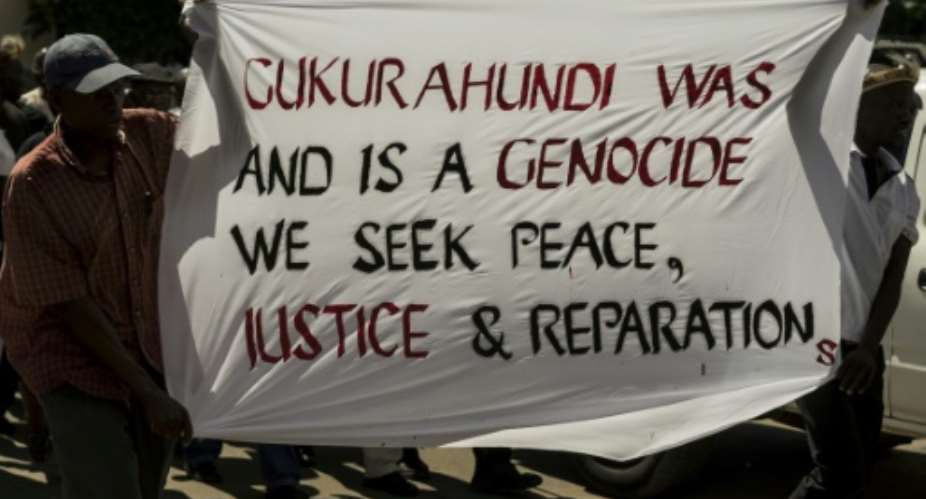A Zimbabwean organisation has started exhuming the remains of victims of a government massacre during former president Robert Mugabe's rule, which claimed some 20,000 lives.
Mugabe's regime deployed a North Korean-trained crack military unit to fight alleged dissidents in parts of the Matabeleland and Midlands provinces in the 1980s, according to rights groups.
The targets were mainly from the Ndebele ethnic group, perceived as backing a rival to Mugabe, who is from the majority Shona group.
Mugabe did not publicly apologise for the crackdown codenamed Gukurahundi (which means "the rain that washes away the chaff" in Shona) except calling the killings "a moment of madness."
The remains of Thembi Ngwenya, aged 21 at the time of her death in 1983, were the first to be exhumed as part of a healing process promised by the government.
Ngwenya was gunned down with her husband while on their way to the local train station in Tsholotsho, according to the head of the national peace and reconciliation commission.
Local villagers buried their bodies in a shallow grave near a railway line.
A non-governmental organisation called the Ukuthula Trust exhumed Ngwenya's remains on Sunday for reburial at a date to be decided later.
"I attended, at the invitation of Ukuthula Trust, the exhumation," Sello Nare, a retired judge who now chairs the national peace and reconciliation commission, told AFP.
"The deceased had been buried in a rocky place and the grave was shallow. The shin bone was protruding from the ground."
"The reburials from my point of view are a healing process. I believe that should create closure as regards what took place."
President Emmerson Mnangagwa who took over from Mugabe following a brief military takeover in 2017, was state security minister at the time of the killings.
He called for open discussion of the Gukurahundi to promote healing.
The national healing commission will hold hearings later this year to "promote national healing."





 Tuesday’s downpour destroys ceiling of Circuit Court '8' in Accra
Tuesday’s downpour destroys ceiling of Circuit Court '8' in Accra
 SOEs shouldn't compromise on ethical standards, accountability – Akufo-Addo
SOEs shouldn't compromise on ethical standards, accountability – Akufo-Addo
 Father of 2-year-old boy attacked by dog appeals for financial support
Father of 2-year-old boy attacked by dog appeals for financial support
 Jubilee House National Security Operative allegedly swindles businessman over sa...
Jubilee House National Security Operative allegedly swindles businessman over sa...
 Nobody can order dumsor timetable except Energy Minister – Osafo-Maafo
Nobody can order dumsor timetable except Energy Minister – Osafo-Maafo
 Mahama wishes National Chief Imam as he clock 105 years today
Mahama wishes National Chief Imam as he clock 105 years today
 J.B.Danquah Adu’s murder trial: Case adjourned to April 29
J.B.Danquah Adu’s murder trial: Case adjourned to April 29
 High Court issues arrest warrant for former MASLOC Boss
High Court issues arrest warrant for former MASLOC Boss
 Align academic curriculum with industry needs — Stanbic Bank Ghana CEO advocates
Align academic curriculum with industry needs — Stanbic Bank Ghana CEO advocates
 Election 2024: We'll declare the results and let Ghanaians know we've won - Manh...
Election 2024: We'll declare the results and let Ghanaians know we've won - Manh...
